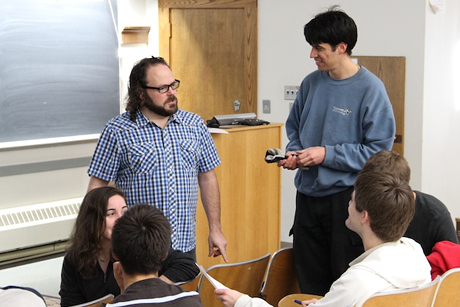New project 'flips' the teaching of science
By Linda B. Glaser

A new five-year pilot project in the College of Arts and Sciences will help science professors teach students at Cornell in new and exciting ways. The project will implement the “flipped classroom” model advocated by Nobel laureate Carl Wieman.
Traditional lectures are designed to transfer knowledge from teacher to student. In the flipped classroom model, that transfer occurs via homework assignments outside the classroom. Class time focuses on applying the new knowledge via problem-solving and reasoning practice to give students experience making and testing predictions and solving problems. Recent research shows that the extent to which students engage in deliberate practice is more important to their ultimate success than their initial interest or talent for a subject.
Another key component of this new approach to teaching is rigorous assessments of what students actually learn, built into the course in an integral way. So called “deliberate practice” includes feedback from the teacher and fellow classmates, so that students learn to critique their own reasoning and think about problems the way an expert would. The peer interaction forces students to explain their thinking and to consider other points of view, helping them integrate new information.
“We are extraordinarily fortunate to have this opportunity for Cornell to join the most innovative of our peers at the cutting edge of emerging research on science instruction,” said Laura Brown, vice provost for undergraduate education. “This is a significant, long-term contribution to excellence in undergraduate education.”
Physics and biology will be Cornell’s pioneers, tackling the conversion of four large course sequences each. Because biology encompasses multiple departments, all of them led by the Office of Undergraduate Biology, and the physics course is part of a sequence required for engineering students, the pilot project will have a universitywide impact, reaching almost 3,000 students.
“The only way people learn is when they’re not just listening to the problem but they’re engaged in the problem,” said Jed Sparks, biology project lead. “All students benefit from this approach – at-risk students, top students, everybody.”
Peter Lepage, former dean of the College of Arts and Sciences, had long wanted to implement Weiman’s ideas, but creating a new pedagogical model in the midst of Cornell’s budget crisis seemed impossible. Then one day Alex and Laura Hanson, Class of 1987, heard Lepage’s enthusiastic description of the concept.
“We looked into the idea extensively and found the research on how it benefits students really compelling,” said Alex Hanson. “We decided to fund a pilot project to give faculty a chance to implement this exciting model at Cornell.”
“We’re extremely grateful to Alex and Laura who have made this possible,” said Lepage. “The resources needed to do this are significant, comparable to a large research grant.”
The funds will help develop new curricula, create new classroom materials and promote new techniques. The college’s long-term goal is to convert many more courses to this model. Once curricula are developed and materials created, the deliberate practice approach should not mean more work for the faculty, according to Lepage.
Physics project lead Tomás Arias views the deliberate practice project as a social imperative: STEM (science, technology, engineering, math) majors need expert-level mastery of basic skills to compete in a global economy. Studies have shown that the deliberate practice model is the quickest path to expert-level mastery of a given skill set and that this type of learning shrinks the achievement gap for students from educationally disadvantaged backgrounds.
The Center for Teaching Excellence is a key partner in the project. Other support will be provided by the Learning Strategies Center, Cornell Information Technologies and the Center for the Integration of Research, Teaching, and Learning.
Linda B. Glaser is staff writer for the College of Arts and Sciences.
Media Contact
Get Cornell news delivered right to your inbox.
Subscribe